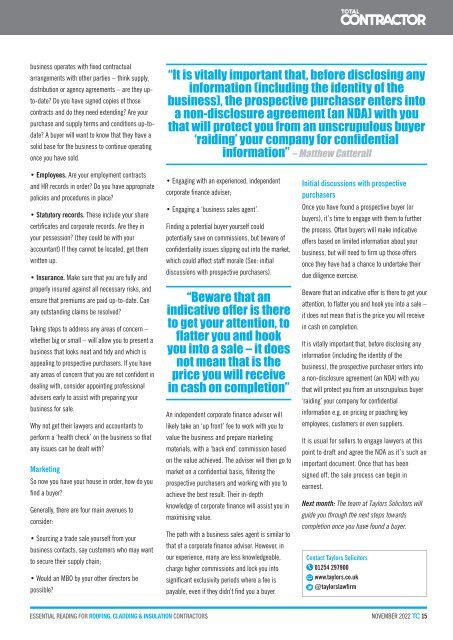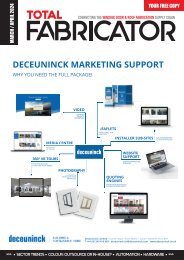November 2022
You also want an ePaper? Increase the reach of your titles
YUMPU automatically turns print PDFs into web optimized ePapers that Google loves.
usiness operates with fixed contractual<br />
arrangements with other parties – think supply,<br />
distribution or agency agreements – are they upto-date?<br />
Do you have signed copies of those<br />
contracts and do they need extending? Are your<br />
purchase and supply terms and conditions up-todate?<br />
A buyer will want to know that they have a<br />
solid base for the business to continue operating<br />
once you have sold.<br />
“It is vitally important that, before disclosing any<br />
information (including the identity of the<br />
business), the prospective purchaser enters into<br />
a non-disclosure agreement (an NDA) with you<br />
that will protect you from an unscrupulous buyer<br />
‘raiding’ your company for confidential<br />
information” – Matthew Catterall<br />
• Employees. Are your employment contracts<br />
and HR records in order? Do you have appropriate<br />
policies and procedures in place?<br />
• Statutory records. These include your share<br />
certificates and corporate records. Are they in<br />
your possession? (they could be with your<br />
accountant) If they cannot be located, get them<br />
written up.<br />
• Insurance. Make sure that you are fully and<br />
properly insured against all necessary risks, and<br />
ensure that premiums are paid up-to-date. Can<br />
any outstanding claims be resolved?<br />
Taking steps to address any areas of concern –<br />
whether big or small – will allow you to present a<br />
business that looks neat and tidy and which is<br />
appealing to prospective purchasers. If you have<br />
any areas of concern that you are not confident in<br />
dealing with, consider appointing professional<br />
advisers early to assist with preparing your<br />
business for sale.<br />
Why not get their lawyers and accountants to<br />
perform a ‘health check’ on the business so that<br />
any issues can be dealt with?<br />
Marketing<br />
So now you have your house in order, how do you<br />
find a buyer?<br />
Generally, there are four main avenues to<br />
consider:<br />
• Sourcing a trade sale yourself from your<br />
business contacts, say customers who may want<br />
to secure their supply chain;<br />
• Would an MBO by your other directors be<br />
possible?<br />
• Engaging with an experienced, independent<br />
corporate finance adviser;<br />
• Engaging a ‘business sales agent’.<br />
Finding a potential buyer yourself could<br />
potentially save on commissions, but beware of<br />
confidentiality issues slipping out into the market,<br />
which could affect staff morale (See: initial<br />
discussions with prospective purchasers).<br />
“Beware that an<br />
indicative offer is there<br />
to get your attention, to<br />
flatter you and hook<br />
you into a sale – it does<br />
not mean that is the<br />
price you will receive<br />
in cash on completion”<br />
An independent corporate finance adviser will<br />
likely take an ‘up front’ fee to work with you to<br />
value the business and prepare marketing<br />
materials, with a ‘back end’ commission based<br />
on the value achieved. The adviser will then go to<br />
market on a confidential basis, filtering the<br />
prospective purchasers and working with you to<br />
achieve the best result. Their in-depth<br />
knowledge of corporate finance will assist you in<br />
maximising value.<br />
The path with a business sales agent is similar to<br />
that of a corporate finance adviser. However, in<br />
our experience, many are less knowledgeable,<br />
charge higher commissions and lock you into<br />
significant exclusivity periods where a fee is<br />
payable, even if they didn’t find you a buyer.<br />
Initial discussions with prospective<br />
purchasers<br />
Once you have found a prospective buyer (or<br />
buyers), it’s time to engage with them to further<br />
the process. Often buyers will make indicative<br />
offers based on limited information about your<br />
business, but will need to firm up those offers<br />
once they have had a chance to undertake their<br />
due diligence exercise.<br />
Beware that an indicative offer is there to get your<br />
attention, to flatter you and hook you into a sale –<br />
it does not mean that is the price you will receive<br />
in cash on completion.<br />
It is vitally important that, before disclosing any<br />
information (including the identity of the<br />
business), the prospective purchaser enters into<br />
a non-disclosure agreement (an NDA) with you<br />
that will protect you from an unscrupulous buyer<br />
‘raiding’ your company for confidential<br />
information e.g. on pricing or poaching key<br />
employees, customers or even suppliers.<br />
It is usual for sellers to engage lawyers at this<br />
point to draft and agree the NDA as it’s such an<br />
important document. Once that has been<br />
signed off, the sale process can begin in<br />
earnest.<br />
Next month: The team at Taylors Solicitors will<br />
guide you through the next steps towards<br />
completion once you have found a buyer.<br />
Contact Taylors Solicitors<br />
01254 297900<br />
www.taylors.co.uk<br />
@taylorslawfirm<br />
NOVEMBER <strong>2022</strong> TC 15

















